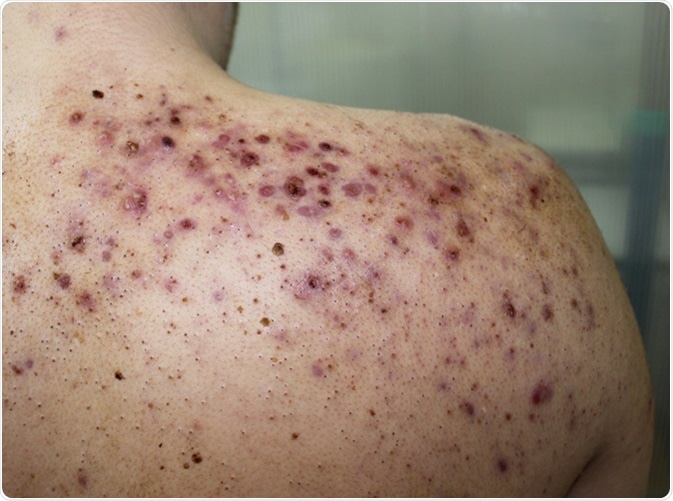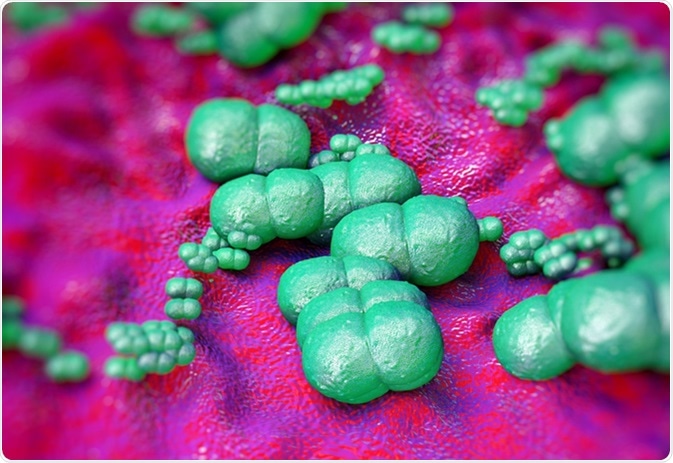What is acne?
Acne vulgaris (AV) is a skin disease that is caused by an overgrowth of the Propionibacterium acnes commensal skin bacterium. The symptoms of AV include non-inflammatory lesions, inflammatory lesions, and varying degrees of scarring to the pilosebaceous unit (composed of the hair follicle and its associated muscles and glands). The symptoms of acne vary greatly depending on the severity.
AV is extremely common and has a global prevalence rate of approximately 85%. Although AV is most prevalent during adolescence and throughout puberty, it can persist into adulthood. This is shown by a prevalence rate of approximately 51% in females aged 20-29, and approximately 26% in females aged 40-49.

A case of severe form of acne vulgaris (acne conglobata) in a young male. Image Credit: Dermatology11 / Shutterstock
Acne and the gut
The commensal bacteria in the intestines performs multiple functions that include:
- Maintaining structural and functional integrity of the gut
- Regulating the immune system
- Breaking down food
- Preventing the growth of harmful bacteria
Studies have shown that the composition of the commensal bacteria of the gastrointestinal (GI) tract can affect the skin of an individual. Small intestinal bacterial overgrowth can lead to increased intestinal permeability, which can cause systemic inflammation. This systemic inflammation can enhance the symptoms and development of AV.
Common treatments for acne
There are various treatment options available for acne, each with varying degrees of success. Unfortunately, there is currently no cure for acne and the treatment options available can cause some adverse effects.
The most common treatments for acne include topical therapies, systemic antibiotic medication for adult patients, and hormonal agents for AV in adult women. Additionally, a combination of these therapy types can also be used, if necessary.
Benzoyl peroxide is the most commonly used topical treatment for acne, as it is available over the counter and most patients can tolerate it quite well.
Isotretinoin (a derivative of vitamin A) is a powerful agent that can be used to treat acne. However, its use must be heavily regulated as it can cause some very severe adverse effects. Women using isotretinoin need to use reliable birth control methods and have regular pregnancy testing, as the medication can cause severe congenital defects.
Treatment/prevention of acne using probiotics
Probiotics are live microorganisms that can alter the homeostasis of microbiomes of the body, especially within the digestive tract. There are many different types of probiotics that can help with many different symptoms, most of which are symptoms of GI tract disorders.
Microorganisms in the human skin microbiome have been shown to help fight pathogens and maintain homeostasis of the skin microbiome. For instance, Staphylococcus epidermidis (S. epidermidis) has been shown to aid in the fermentation of glycerol which inhibits P. acnes effects. This is achieved by microorganisms using sugars (glycerol in this case) to create ethanol and short-chain fatty acids (SCFAs). Both ethanol and SCFAs exhibit antimicrobial effects, which aid in the fight against P. acnes.

Staphylococcus epidermidis bacteria - Illustration Credit: Shutterstock
Due to this, many SCFAs are used to treat acne. In fact, lactic acid (an SCFA) and glycerol are ingredients in many skin care products, acting as moisturizers or anti-inflammatory agents. S. epidermidis fermentation has also been used to treat other AV-related skin disorders.
As previously discussed, the commensal bacteria in the intestines can play a part in the development and maintenance of acne. Research has shown that diets that affect these commensal bacteria can help with the symptoms of AV. Persons consuming low-glycemic diets experienced improved acne symptoms compared with those consuming high-glycemic diets in one study. It was demonstrated that high-glycemic diets contribute to acne symptoms by causing hyperinsulinemia, but low-glycemic diets prevent hyperinsulinemia by lowering postprandial insulin.
How effective are probiotics for acne treatment/prevention?
Most of the literature around this topic suggests that probiotics have a lot of potential as treatments for AV. The effectiveness of both topical and oral probiotics has been tested and both have been shown to be effective, however, which one is the better option seems to vary depending on the study.
For some individuals, the other previously discussed methods of treatment are more effective than probiotic treatments. All of these findings suggest that the effectiveness of probiotic treatment may be affected by the varied expression of acne between individuals.
Further Reading
Last Updated: Mar 14, 2019